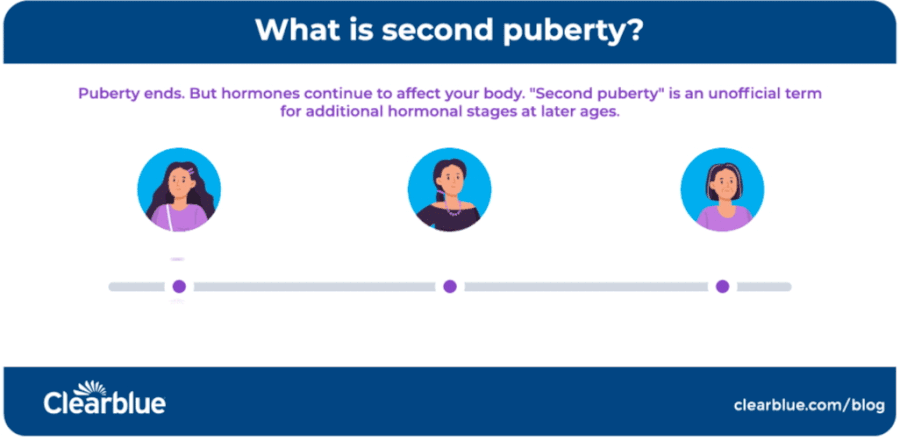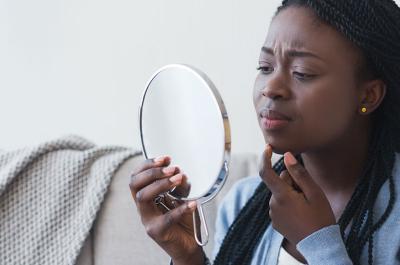Second puberty: What it is and how to deal with it

It’s tempting to think that once puberty is over, you won’t experience any more hormonal transitions until perimenopause arrives. But the reality is, our bodies continue to change inside and out as we mature. Sometimes those changes are gradual and subtle, like a decrease in bone mass. Other times they can feel more abrupt, like surprisingly irregular periods.
So, what do we call those changes? Lately, people have been calling it second puberty.
Here, we talk about what second puberty may look like in different age stages — as well as suggest some self-care tips for handling changes as they come.
What is second puberty?
Second puberty isn’t an official medical term. It’s more like slang for significant hormonal and bodily changes women experience after “first” puberty and leading up to menopause. While you may have heard about how the menstrual cycle changes over time in health class, there are a lot of other physical (and sometimes emotional) changes you may want to have on your radar for the future.
So, when does second puberty start?
Because there’s no specific age range when hormones shift, second puberty isn’t something you can expect to see at a certain time. It can, however, be a helpful way to describe what you’re going through when talking about hormonal changes you may experience after ‘first’ puberty.
It’s safe to say that second puberty can describe any of the significant hormonal shifts women go through between puberty and menopause. For most women, that means any time in their 20s, 30s or 40s.

How does your body change in second puberty?
Aging is a natural part of life. Your body continues to change in your 20s, and well into your 30s (though maybe not as dramatically as before). And in your 40s? Your body will change even more than in the last ten years — possibly at a faster pace. Especially since this is when perimenopause may start to kick in.
Fertility and periods
Your hormones affect many body processes, including your menstrual cycle.1 When hormones fluctuate you might also experience mood shifts or sleep problems.2
What you could expect…
- In your 20s: Peak fertility,3 shorter, more regular periods than in the first years after the start of your cycle4
- In your 30s: Gradual decline in fertility,3 lower levels of estrogen and progesterone2
- In your 40s: Start of perimenopause, irregular periods (e.g., longer or shorter than previously, heavier or lighter flow), hot flashes, sleep problems, vaginal dryness, weight gain1,2,5
Self-care tips
- Track your period. Tracking your period can help you notice changes and help you plan for the future. Having a good handle on what a typical menstrual cycle looks like for you will help you and your doctor determine if differences in your physical and mental health might be connected to changing hormonal balances.
- Talk to your doctor about fertility (and infertility). Fertility is different for everyone, so it’s a good idea to talk to your doctor if you want to start trying to conceive. It’s especially important to talk to your doctor about infertility if you’re under 35 and have been trying to get pregnant for a year, over 35 and have been trying for six months or right away if you’re 40 or older.
Bone and muscle mass
Shifting hormones from aging can lead to a decrease in muscle mass6 and impact your body’s ability to build and maintain healthy, strong bones. Bone development is fastest before your 20s, but it doesn’t stay fixed once you hit them.7
What you could expect…
- In your 20s: Peak bone mass,7 good joint strength6
- In your 30s: Gradual bone loss7
- In your 40s: More rapid bone loss,7 muscle loss6
Self-care tips
- Exercise regularly. Working out (especially with weight-bearing exercises) helps you build and maintain both muscle mass and healthy, strong bones.7 Talk to your doctor about what exercise routine will be a good fit for you and your goals.
- Make sure you get enough calcium and Vitamin D. These are the building blocks of bones, and your body needs to get enough of them to build and maintain bone mass as you age.7 Try eating more calcium-rich foods like dairy products, sardines, salmon and dark leafy greens.8 (Make sure to consult your healthcare provider before starting any supplement.).
Skin and hair health
Collagen is an important part of your body’s connective tissues — and that includes your skin.9 As collagen levels decrease over time, you may notice your skin changing. Hormonal acne can also become part of your regular cycle, or be a sign of more gradual, ongoing hormonal changes. When you’re approaching menopause, you may see differences in your hair, too.
What you could expect…
- In your 20s and 30s: Gradual formation of fine lines and wrinkles10
- In your 40s: Thinning hair, drier skin2
Self-care tips
- Add more collagen to your life. Collagen supplements or a collagen-rich diet may be a good choice for you, too.11 Talk to your doctor or dermatologist if you think your skin would like a little extra pampering.
- Protect your skin. Spending time in the sun? Be sure to use sunscreen or protective clothing to keep your skin safe. Also make sure to get the best nutrition possible for your health.10
Some suggestions for how to deal with second puberty
So far, we’ve talked a lot about what second puberty may look like (and how to handle it) on a physical level. But the emotional side of the experience is just as important — and deserves care and attention, too.
Watching your body change can feel stressful, and that certainly doesn’t make the process any easier. But how you handle stressors like these in your life is a big part of how you stay healthy and build toward a healthier future. Here are some ideas for taking care of yourself and seeking support while you navigate second puberty.
Talk with your doctor
Changes can feel scary, but knowledge is power. Understanding what’s going on with your body (and what to expect later) may help you feel more comfortable with second puberty. Luckily, your doctor is there to answer your questions, address any health concerns and help come up with a course of action.
Reach out to friends and family
We all have at least one thing in common: We’re all getting older and adapting to life changes as we go. Try talking to your loved ones about what you’re going through. Whether they’ve been through something similar or not, being around people who listen and understand you can do wonders for your mental health. As a bonus, maybe someday you can be there for them, too.
Embrace the change
The changes of second puberty are signs that your body is adapting. Why not take that as an invitation to embrace those changes mentally and emotionally? Some days it may feel easy, some days it might not. Whatever your feelings may be, they are valid. Talking to a mental health professional could be a big help too, so don’t hesitate to reach out for support.
Be kind to yourself
Take extra care to be patient with yourself — just like you would for a friend who was having a rough time. Consider some additional self-care when the time feels right. Things you can do to feel better on your period might be a good place to start if you’re looking for some ideas. Your body is working hard to handle ongoing changes. Take care of it and yourself.
The changes in your body that come with these hormonal transitions, whether you call them second puberty or not, are a completely normal part of aging. By learning what to expect in different phases of your life, you can plan ahead and set yourself up as best as possible for a happy and healthy future.
Related Blog Content
Sources
- The American College of Obstetricians and Gynecologists. “The Menopause Years.” Accessed 30 Aug. 2022.
https://www.acog.org/womens-health/faqs/the-menopause-years - Mayo Clinic. “Menopause.” Accessed 31 Aug. 2022. https://www.mayoclinic.org/diseases-conditions/menopause/symptoms-causes/syc-20353397
- Korula George and Mohan S. Kamath. “Fertility and age.” National Library of Medicine. 2010. Accessed 30 Aug. 2022. https://www.ncbi.nlm.nih.gov/pmc/articles/PMC3017326/
- Mayo Clinic. “Menstrual cycle: What’s normal, what’s not.” Accessed 19 Oct. 2022. https://www.mayoclinic.org/healthy-lifestyle/womens-health/in-depth/menstrual-cycle/art-20047186
- The American College of Obstetricians and Gynecologists. “Perimenopausal Bleeding and Bleeding After Menopause.” Accessed 30 Aug. 2022. https://www.acog.org/womens-health/faqs/perimenopausal-bleeding-and-bleeding-after-menopause
- Karsten Keller and Martin Engelhardt. “Strength and muscle mass loss with aging process. Age and strength loss.” National Library of Medicine. 2014. Accessed 23 Aug. 2022. https://www.ncbi.nlm.nih.gov/pmc/articles/PMC3940510/
- American Academy of Orthopaedic Surgeons. “Healthy Bones at Every Age.” Orthoinfo. Accessed 23 Aug. 2022. https://orthoinfo.aaos.org/en/staying-healthy/healthy-bones-at-every-age/
- National Institutes of Health. “Calcium Fact Sheet for Health Professionals.” 2022. Accessed 30 Aug. 2022. https://ods.od.nih.gov/factsheets/Calcium-HealthProfessional/#h3
- Preety Panwar, Guillaume Lamour, Neil C. W. Mackenzie, Heejae Yang, Frank Ko, Hongbin Li, and Dieter Brömme. “Changes in Structural-Mechanical Properties and Degradability of Collagen during Aging-associated Modifications.” National Library of Medicine. 2015. Accessed 26 Sept. 2022. https://www.ncbi.nlm.nih.gov/pmc/articles/PMC4645626/
- Mayo Clinic. “Wrinkles.” Accessed 19 Oct. 2022. https://www.mayoclinic.org/diseases-conditions/wrinkles/symptoms-causes/syc-20354927
- Liane Bolke, Gerrit Schlippe, Joachim Gerß, and Werner Voss. “A Collagen Supplement Improves Skin Hydration, Elasticity, Roughness, and Density: Results of a Randomized, Placebo-Controlled, Blind Study. Nutrients. 2019. Accessed 19 Oct. 2022. https://www.ncbi.nlm.nih.gov/pmc/articles/PMC6835901/




